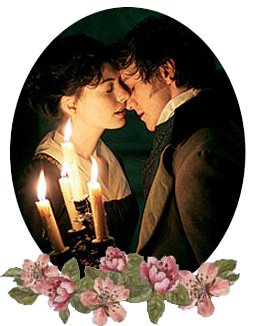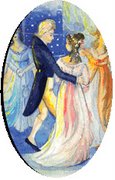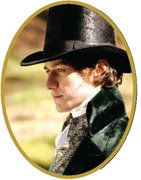
In celebration for Valentine’s Day, let us look for ‘love’ or should I say ‘romance’ in Emma. Maybe I should say more appropriately ‘falling in love’ which is recognizing our feelings toward another.
We find in Chapter 47 that Emma believes that Harriet Smith is in love with Mr. Knightley instead of Frank Churchill whom Emma has been promoting. To make matters worse, Mr. Knightley has said things to Harriet that has led her to believe that he feels the same toward her.
Here is Emma’s reaction to those false beliefs:
Emma's eyes were instantly withdrawn; and she sat silently meditating, in a fixed attitude, for a few minutes. A few minutes were sufficient for making her acquainted with her own heart. A mind like her's, once opening to suspicion, made rapid progress. She touched -- she admitted -- she acknowledged the whole truth. Why was it so much worse that Harriet should be in love with Mr. Knightley, than with Frank Churchill? Why was the evil so dreadfully increased by Harriet's having some hope of a return? It darted through her, with the speed of an arrow, that Mr. Knightley must marry no one but herself!
So, there we have Emma’s awakening. Now we go to Chapter 49 to find that Mr. Knightley has been mislead by events to think Emma has feelings for Frank Churchill. In this chapter he finds out that Emma is not the least upset over the Frank Churchill – Jane Fairfax affair. Here is the quote from Chapter 49:
He stopped in his earnestness to look the question, and the expression of his eyes overpowered her. "My dearest Emma," said he, "for dearest you will always be, whatever the event of this hour's conversation, my dearest, most beloved Emma -- tell me at once. Say 'No,' if it is to be said." She could really say nothing. "You are silent," he cried, with great animation; "absolutely silent! at present I ask no more." Emma was almost ready to sink under the agitation of this moment. The dread of being awakened from the happiest dream, was perhaps the most prominent feeling. "I cannot make speeches, Emma," he soon resumed; and in a tone of such sincere, decided, intelligible tenderness as was tolerably convincing. "If I loved you less, I might be able to talk about it more. But you know what I am. You hear nothing but truth from me. I have blamed you, and lectured you, and you have borne it as no other woman in England would have borne it. Bear with the truths I would tell you now, dearest Emma, as well as you have borne with them. The manner, perhaps, may have as little to recommend them. God knows, I have been a very indifferent lover. But you understand me. Yes, you see, you understand my feelings -- and will return them if you can. At present, I ask only to hear, once to hear your voice." While he spoke, Emma's mind was most busy, and, with all the wonderful velocity of thought, had been able -- and yet without losing a word -- to catch and comprehend the exact truth of the whole; to see that Harriet's hopes had been entirely groundless, a mistake, a delusion, as complete a delusion as any of her own -- that Harriet was nothing; that she was every thing herself; that what she had been saying relative to Harriet had been all taken as the language of her own feelings; and that her agitation, her doubts, her reluctance, her discouragement, had been all received as discouragement from herself. And not only was there time for these convictions, with all their glow of attendant happiness; there was time also to rejoice that Harriet's secret had not escaped her, and to resolve that it need not and should not. It was all the service she could now render her poor friend; for as to any of that heroism of sentiment which might have prompted her to entreat him to transfer his affection from herself to Harriet, as infinitely the most worthy of the two -- or even the more simple sublimity of resolving to refuse him at once and for ever, without vouchsafing any motive, because he could not marry them both, Emma had it not. She felt for Harriet, with pain and with contrition; but no flight of generosity run mad, opposing all that could be probable or reasonable, entered her brain. She had led her friend astray, and it would be a reproach to her for ever; but her judgment was as strong as her feelings, and as strong as it had ever been before, in reprobating any such alliance for him, as most unequal and degrading. Her way was clear, though not quite smooth. She spoke then, on being so entreated. What did she say? Just what she ought, of course. A lady always does. She said enough to show there need not be despair -- and to invite him to say more himself. He had despaired at one period; he had received such an injunction to caution and silence, as for the time crushed every hope; -- she had begun by refusing to hear him. The change had perhaps been somewhat sudden; -- her proposal of taking another turn, her renewing the conversation which she had just put an end to, might be a little extraordinary! She felt its inconsistency; but Mr. Knightley was so obliging as to put up with it, and seek no further explanation. Seldom, very seldom, does complete truth belong to any human disclosure; seldom can it happen that something is not a little disguised, or a little mistaken; but where, as in this case, though the conduct is mistaken, the feelings are not, it may not be very material. Mr. Knightley could not impute to Emma a more relenting heart than she possessed, or a heart more disposed to accept of his.
I have quoted quite a bit, but the entire Chapter 49 should be read to fully appreciate the full extent of their ‘feelings’. You can’t tell me that Jane Austen did not know about ‘love’.
I will direct you to the ‘Passionate Passages’ in Emma that we collected at the Male Voices web site some years ago, wherein you will find Chapter 49 quoted in its entirety at the end of that page. CLICK HERE.
A personal note about this sentence: It darted through her, with the speed of an arrow, that Mr. Knightley must marry no one but herself! I can remember the exact time and place when I ‘fell in love’ with my one-and-only. It was the work of an instant.
Wishing you all a very Happy Valentine’s Day, I can’t help but wonder if the holiday is celebrated world wide?
Linda the Librarian
Pic: 1996 Emma Woodhouse (Kate Beckinsale) and Mr. Knightley (Mark Strong) from TheEditrix's Photobucket. Icha's comment: I know Linda loves Kate's Emma, so I hope she likes this one...

















































